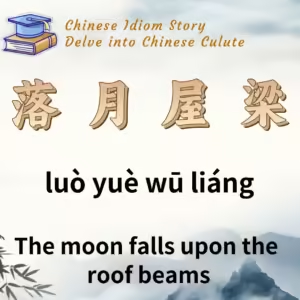
Chinese Idiom: 落月屋梁 (Luo Yue Wu Liang)
English Translation: The moon falls upon the roof beams
pīn yīn: luò yuè wū liáng
Idiom Meaning: This idiom expresses a deep longing and remembrance for a friend.
Historical Source: The idiom originates from a poem titled Dreaming of Li Bai (《梦李白》) by the Tang Dynasty poet Du Fu (杜甫).
Idiom Story:
Du Fu and Li Bai were close friends who traveled together, but after parting ways in Shandong, Du Fu often thought of Li Bai. This feeling intensified, especially after hearing that Li Bai had been sentenced to exile for participating in the court of the prince Yong and that there were rumors he had drowned during his journey. Du Fu grew increasingly concerned for his old friend’s safety. Over time, his thoughts of Li Bai became so overwhelming that they manifested in dreams.
To express his feelings, Du Fu composed two poems titled Dreaming of Li Bai. In one of the poems, he wrote about the scene of Li Bai entering his dreams:
“An old friend enters my dream, reminding me of my constant longing.
You are now ensnared in a net; how can you have wings to fly?
Could it be that this vision is not your living soul,
But instead a distant journey, too uncertain to comprehend?
Your spirit comes through the green maple forest,
Only to return to the dark night of the frontier.
The falling moon fills the beams of the room,
Hesitating to illuminate your face.
The water is deep and the waves are loud;
Do not let the dragon devour you.”
In these lines, Du Fu reflects on his feelings of missing Li Bai, noting that even though they are separated by great distances, his spirit visits him in dreams. He expresses concern for Li Bai’s predicament and hopes for his safety, using the imagery of moonlight falling on the beams of his room to evoke the presence of his friend.
As a result of this poignant expression of longing and nostalgia, “落月屋梁” became an idiom representing the deep sentiment of missing a friend.






